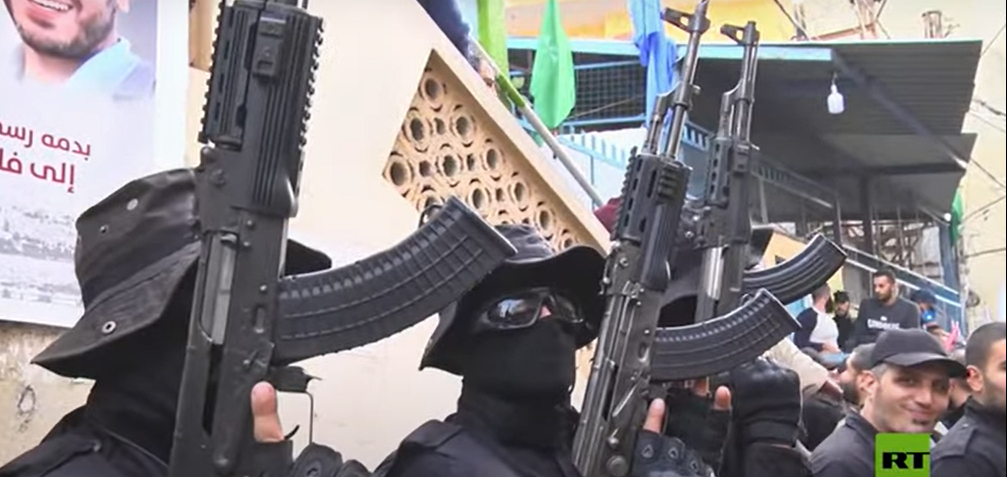Both Jenin city and the adjacent refugee camp are modifying their fighting tactics in response to the IDF’s revival of targeted assassinations.
Last week, the IDF employed an unmanned aerial vehicle (UAV) for the first time since 2006, successfully eliminating a squad of three terrorists who were returning from a shooting attack near the Al-Jalameh checkpoint in the Jenin area.
The Palestinians perceive Israel’s reinstatement of targeted assassinations as a shift in the established rules of engagement, prompting them to declare their intention to escalate terrorist activities.
On January 25th, Hamas’s military wing issued a statement asserting that Israel’s use of planes against Palestinians marks “the beginning of the end of Israel’s existence and its defeat in the face of Palestinian resistance.”
The announcement proclaimed that “the streets of the West Bank have now become explosive devices, detonating in the face of Zionist occupation.”
At the Jenin refugee camp, the remains of an IDF armored vehicle of the “Panther” type, which was disabled by a large explosive device during an IDF operation to apprehend wanted terrorists, are proudly displayed.
IDF investigations revealed that intelligence regarding the explosive was available but operational errors occurred.
Nevertheless, the Palestinians insist that the IDF lacks sufficient intelligence about the situation in Jenin city and the adjacent refugee camp.
Jenin is preparing for the possibility of an IDF surprise attack and is bracing itself for an extensive operation aimed at eliminating armed terrorist groups within the city.
The Palestinians are greatly apprehensive about Israel’s
use of drones for targeted assassinations.
Consequently, armed terrorist groups in the Jenin refugee camp have launched an operation known as “blocking Jenin’s airspace.”
They have spread nylon sheets and cloths across the narrow alleys of the camp to obstruct the drones’ field of view and to hinder IDF snipers from monitoring the camp’s alleys.
Simultaneously, they have begun burying large explosive devices at specific points in both the Jenin refugee camp and the nearby city, in case IDF forces re-enter the area to arrest wanted terrorists.
The terrorists aim to force IDF forces to navigate through the narrow alleys of the refugee camp by erecting barricades, making it easier for them to target the soldiers.
The armed terrorist groups are now emulating fighting methods used in the Gaza Strip and southern Lebanon, transforming the Jenin area into a zone the IDF would avoid entering due to the potential harm it could inflict on its troops.
Furthermore, the armed terrorist groups have identified that the main vulnerability of the IDF and Jewish settlers in the Samaria region lies in their usage of major traffic routes. Consequently, they have decided to intensify shooting attacks against Israeli vehicles and IDF checkpoints, targeting them while in motion.
Officials from the Islamic Jihad state that squads in vehicles will unexpectedly appear on the main thoroughfares at all hours of the day and night to launch attacks on Israeli vehicles and IDF checkpoints. Additionally, they plan to set up ambushes along these routes.
In Jenin, armed groups strive to regain the city’s esteemed status within the Palestinian resistance to Israel, as it held during the second intifada in 2002, when it served as the capital city of the Palestinian resistance in the West Bank.
These groups also recruit young boys, aged between 10 and 15, to participate in the fight against Israel, assisting the terrorists with observation and logistics operations.
In the Jenin refugee camp, new armed groups have begun to emerge, with the most recent being a faction of the Popular Front’s military wing known as the “Abu Ali Moustafa Brigades.”
These groups vie with one another for the dubious honor of fighting against IDF forces, aiming to attain recognition on the Palestinian stage.
The younger generation in Jenin is expected to uphold the city’s legacy of resistance against Israel, as witnessed during the first and second intifadas.
In addition to combatting Israel, the armed groups in Jenin are also engaged in a struggle against the Palestinian Authority’s security apparatus, accusing them of cooperating with Israel.
Occasionally, armed terrorists emerge and open fire on the Palestinian Authority’s Mokataa building in the center of Jenin city.
The Palestinian media has joined the war effort against Israel, glorifying and praising the “heroic” acts of the Palestinian terrorists in Jenin in their reports.
This continues despite the successful operations conducted by the IDF in the city and the Jenin refugee camp, and regardless of the higher operational capability of IDF special units compared to the Palestinian terrorists.
Their objective is to establish Jenin as an emblematic city within the current wave of terrorism in Judea and Samaria




